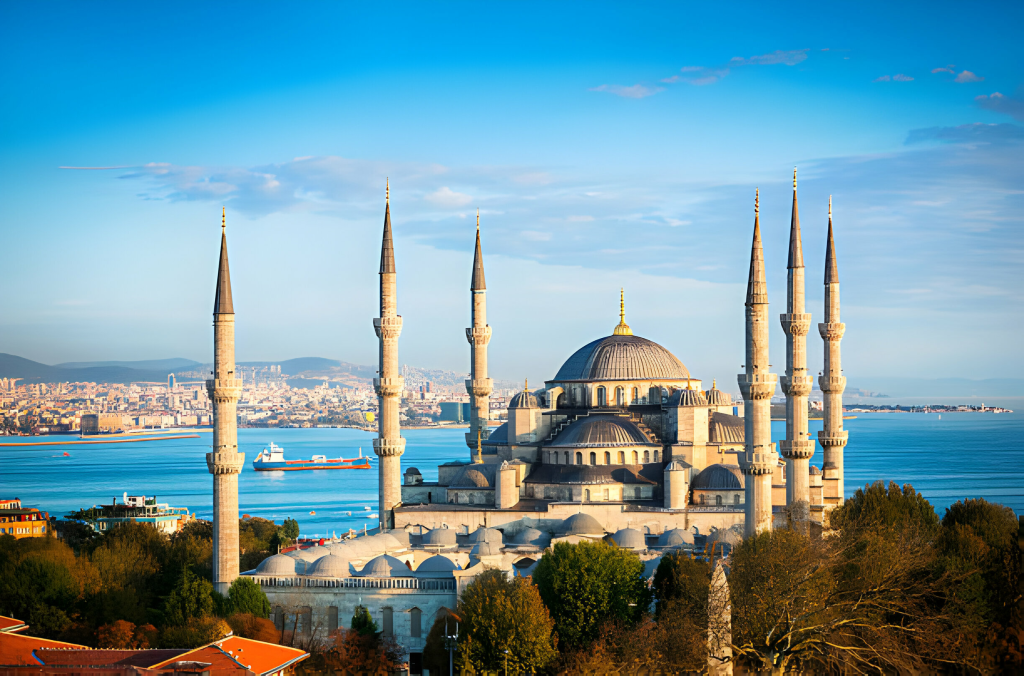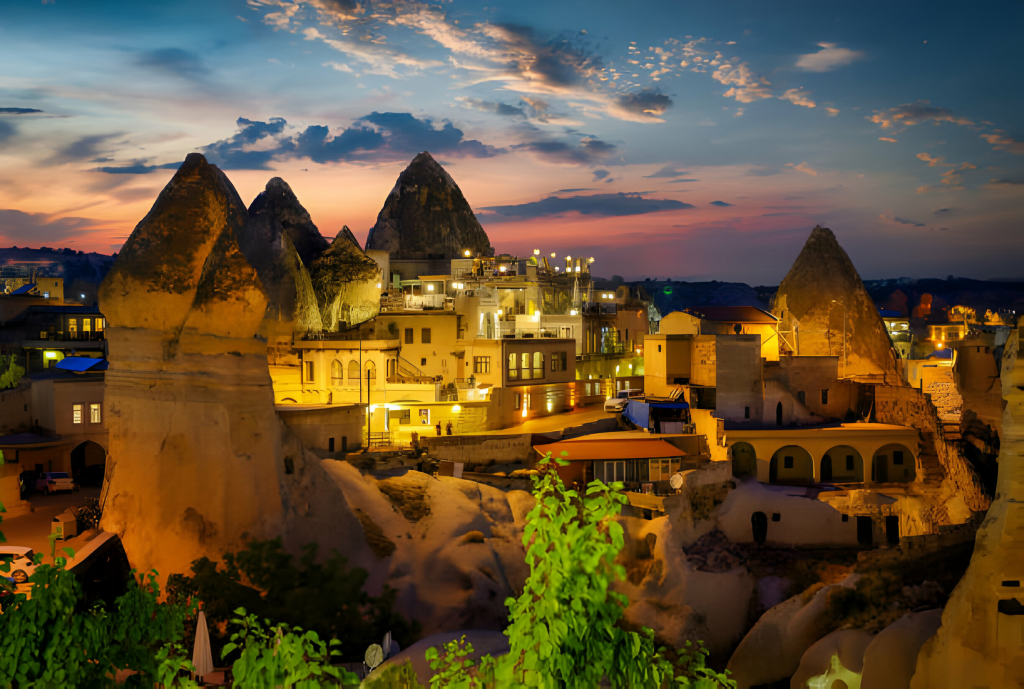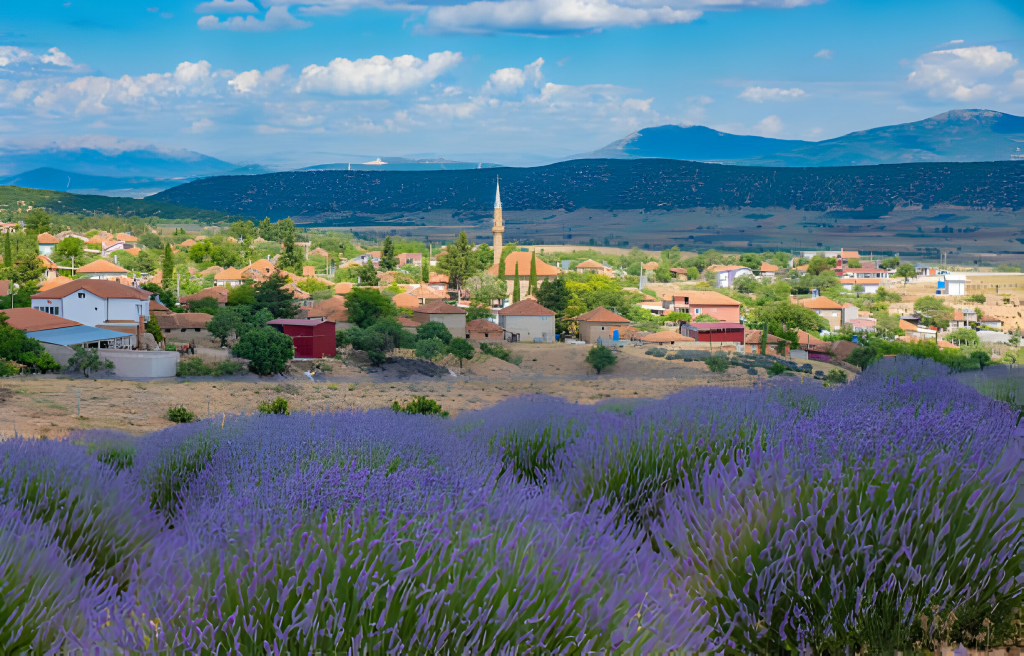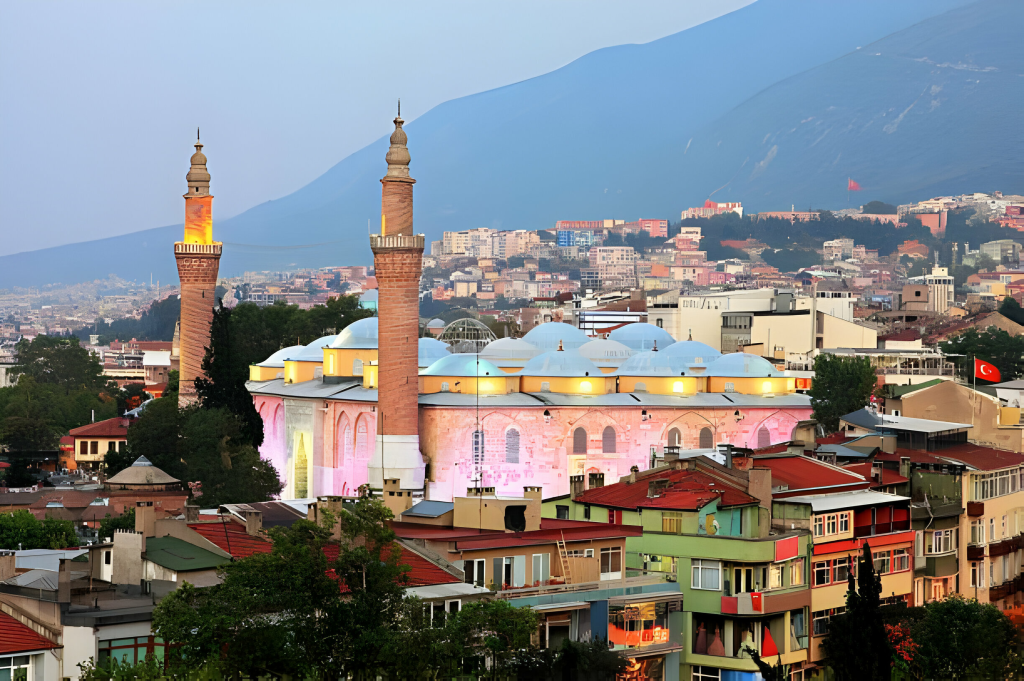Turkey Travel Guide, Best Places to Visit
Situated at the crossroads of West Asia and East Europe, Turkey boasts a unique geographical position, sharing borders with Greece and Bulgaria to the west, Georgia to the northeast, and Iran and Armenia to the east.
In the south, it is neighbored by Syria and Iraq. Despite its vastness, only a mere 5% of Turkey’s landmass falls within Europe.
This diverse country’s culture reflects a rich tapestry of influences from West Asian, European, and indigenous sources.
From the storied history of Istanbul to the exhilarating hot air balloon rides over Cappadocia, from bustling bazaars to magnificent mosques, and a plethora of natural wonders, exploring Turkey promises an enthralling adventure.
Covering an expansive area of 783,562 square kilometers, Turkey ranks as the 37th largest country globally. Istanbul, the vibrant capital and a magnet for visitors, showcases the country’s cultural richness.
Among the top destinations for tourists are Istanbul, Pamukkale, Izmir, Bodrum, Cappadocia, Antalya, and Marmaris, each offering its own distinct charm and allure.

Turkey beckons travelers with a myriad of enticements – from its rich history and vibrant culture to its tantalizing cuisine, cave dwellings, ancient marvels, and soothing thermal spas.
The Anatolia region proudly boasts some of humanity’s earliest settlements, while Istanbul stands as a testament to the unique fusion of European and Asian influences that converge within Turkey’s borders. Known by the English moniker “the land of Turks,” locals affectionately refer to their home as Türkiye.
Quick Facts about Turkey
- Official Language: Turkish, though Kurmani, Arabic, Zaza, and Kabardian are also spoken.
- Capital City: Ankara
- Currency: Turkish Lira
- Major Religions: Islam, Judaism, Christianity
- Regions: Aegean, Black Sea, Central Anatolia, Konya, Eastern Anatolia, Mediterranean, and Marmara.
Istanbul reigns as the largest city in terms of size, followed by Ankara and Izmir. Surrounding Turkey are 500 picturesque islands, all integral parts of the nation.
At a staggering elevation of 5137 meters above sea level, Buyuk Agri peak of the Greater Ararat Mountains claims the title of Turkey’s highest point. The bustling Istanbul Atatürk Airport serves as the country’s largest aviation hub.
Turkey boasts a diverse climate range, from Mediterranean climates along the coast to Continental climates in the Central Anatolian plateau.
Renowned for its succulent kebabs and delectable manti meatballs, Turkey offers a culinary journey like no other.
Turkey Travel Planner – Attractions by Region:
From serene beaches to majestic plateaus, Turkey’s regions offer a tapestry of landscapes and attractions awaiting exploration. Key regions include:
- Aegean
- Black Sea
- Central Anatolia
- Konya Province
- Eastern Anatolia
- Mediterranean
- Marmara
Top 4 Places to Visit in The Aegean:
- The Fethiye Coast: Boasting crystalline waters and charming market towns, Fethiye is a haven for divers and sailors alike.
- Marmaris: Nestled between the Aegean and Mediterranean Seas, Marmaris enchants visitors with pine-covered hills and vibrant resort life.
- The Bodrum Peninsula: A yachting paradise, Bodrum invites travelers to explore its historic sites, beaches, and lively nightlife.
- Pamukkale: Famous for its stunning white terraces and thermal waters, Pamukkale offers a surreal landscape in the valley of the river Menderes.

Top 5 Places to Visit Around the Black Sea
- Kaçkar Mountains– Nestled along the picturesque Black Sea coastline, offer enchanting opportunities for hiking and trekking adventures.

- The Sumela Monastery, an architectural gem dating back to 386 AD nestled within the Pontic Mountains, offers a glimpse into history with its well-preserved church and ornate chapels.
- Flowing through a lush green valley, the Fírtína Deresi river entices adventurers with its swift currents, making it a popular destination for thrilling river rafting and canoeing experiences.
- Karagöl, a secluded natural lake ensconced within serene pine forests, provides a tranquil retreat for nature enthusiasts, who can indulge in leisurely hikes and scenic walking tours amidst its pristine surroundings.
- Zilkale, the medieval fortress set amidst the towering peaks of a mountainous valley, captivates visitors with its historic significance and stunning natural vistas, offering a blend of heritage and scenic beauty.
Exploring Central Anatolia:
- Ankara, the historic capital of Turkey, boasts a plethora of cultural landmarks including the Museum of Anatolian Civilization, the grand Mausoleum of Atatürk, and the imposing Ankara Castle, all of which offer insights into the city’s rich heritage.
- Cappadocia, famed for its semi-desert landscapes punctuated by towering rock formations, beckons adventurers to explore its ancient caves and homes carved into the hillsides since the Bronze Age. Experience the thrill of hot air ballooning as you soar above this unique terrain.

- The Taurus Mountains, characterized by their youthful contours and breathtaking vistas, offer enchanting valleys and ancient Roman trekking routes, providing outdoor enthusiasts with an unforgettable adventure amidst limestone rock formations.
- Situated between the villages of Goreme and Avanos, the Pashabagi Fair Chimneys present a mesmerizing spectacle of chimney-like rock formations, creating a paradise for trekkers and nature lovers alike.
Exploring Konya Province:
- The Mevlana Museum, a revered Sufi complex, houses the tomb of Rumi, the esteemed founder of the sect, offering visitors a glimpse into the spiritual heritage of the region.
- Çatalhöyük stands as a testament to ancient history, boasting the title of the oldest Neolithic settlement dating back a staggering 9000 years, inviting travelers to delve into the mysteries of antiquity.
- Sille, a picturesque village with a rich past as a former Greek settlement, offers a journey through time with its Byzantine churches and captivating museum, showcasing the cultural tapestry of the region.
- Malatya, a city renowned for its delectable cuisine, beckons visitors with its breathtaking natural landscapes. Don’t miss the tranquil nature park and the intriguing Aslantepe ruins, both offering insights into the area’s historical and natural heritage.
Discovering the Mediterranean Region:
- Antalya, a vibrant resort city nestled along the Turkish Riviera, boasts a wealth of attractions including the majestic Düden waterfalls, the iconic Hadrian’s Gate, and the sun-kissed Konyaalti Beach, inviting travelers to bask in its coastal charm.
- Hatay, blessed with scenic beauty and steeped in history, captivates visitors with its capital city Antakya, home to the splendid Archaeology Museum showcasing the rich cultural heritage of the region.
- Isparta, fondly known as the “city of roses,” enchants travelers with its breathtaking mountain vistas, serene lakes, and unparalleled natural beauty, offering a tranquil escape amidst nature’s splendor.

- Mersin, positioned as a bustling port city at the eastern edge of the Mediterranean region, boasts significant historical landmarks such as the birthplace of St. Paul and the renowned Cleopatra’s Gate, offering visitors a glimpse into its rich cultural heritage and ancient past.
Sights to Behold in Marmara
- Istanbul, the vibrant metropolis straddling both Europe and Asia, captivates travelers with its rich tapestry of history and culture. Iconic landmarks such as the Hagia Sophia Museum, the majestic Blue Mosque, and the opulent Topkapi Palace beckon visitors to immerse themselves in the city’s storied past.
- Bursa, a veritable treasure trove of Ottoman heritage, exudes an aura of grandeur with its bustling silk market and magnificent mosques dating back to the 15th century, inviting travelers to explore its rich cultural legacy and architectural splendor.

Turkey Travel Guide – Visa Information:
The Ministry of Foreign Affairs introduced e-visas in 2013, simplifying the visa process for travelers of any nationality with a valid passport. This convenient online system allows applicants to obtain tourist or commercial visas from anywhere with an internet connection.
Ensure your passport has a minimum validity of 6 months from your arrival date in Turkey to qualify for the e-visa.
Please note that e-visas are not applicable for students or individuals intending to work in Turkey. However, they offer a more cost-effective option compared to visas obtained upon arrival.
The application fee, charged in US dollars, will be deducted from your account, with no refunds provided in case of rejection due to discrepancies between the provided information and your passport details.
Additionally, citizens of several countries including Azerbaijan, Belarus, Belize, Bolivia, Ecuador, Iran, Kosovo, Kyrgyzstan, Jordan, Lebanon, Mongolia, Morocco, Qatar, Russia, Tajikistan, Thailand, Tunisia, Turkmenistan, and Uzbekistan are exempt from visa requirements for entry into Turkey.
Turkey’s Diverse Climate:
Turkey’s expansive geography spanning over 1600 kilometers from east to west and 800 kilometers from north to south results in diverse climatic conditions across the country.
Coastal regions like the Mediterranean and Aegean experience hot and dry summers followed by cool and rainy winters.
Conversely, the Black Sea coast receives the highest rainfall in Turkey, while the interior boasts a continental climate with distinct seasons.
Winter extremes vary across regions, with eastern Anatolian plateaus enduring temperatures plummeting to -30 to -40 degrees Celsius, while the western part sees milder averages around 1 degree Celsius. The Konya Ovasi and Malatya Ovasi emerge as the driest regions, highlighting Turkey’s climatic diversity.
Optimal Times for Traveling in Turkey
Spring: Ideal for budget travelers, spring offers pleasant temperatures and longer days, making it suitable for various outdoor activities, especially before the summer heat sets in.
Summer: High tourist season with bustling seaside resorts and vibrant nightlife. Perfect for beach lovers and water activities, although inland destinations like Cappadocia offer off-season discounts.
Autumn: With fewer crowds on beaches and a focus shifting towards urban exploration, autumn provides mild weather conducive to museum visits and outdoor historical sites.
Winter: Best for off-season discounts and winter sports enthusiasts, with snowfall in many parts of the country offering ideal conditions for skiing and skating. Southeast Turkey retains a temperate climate throughout winter.
